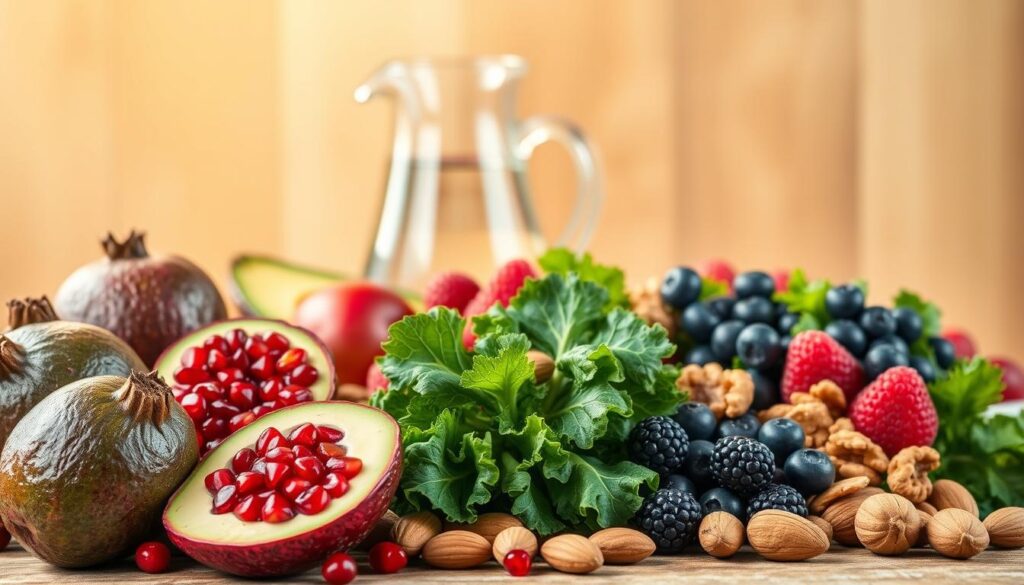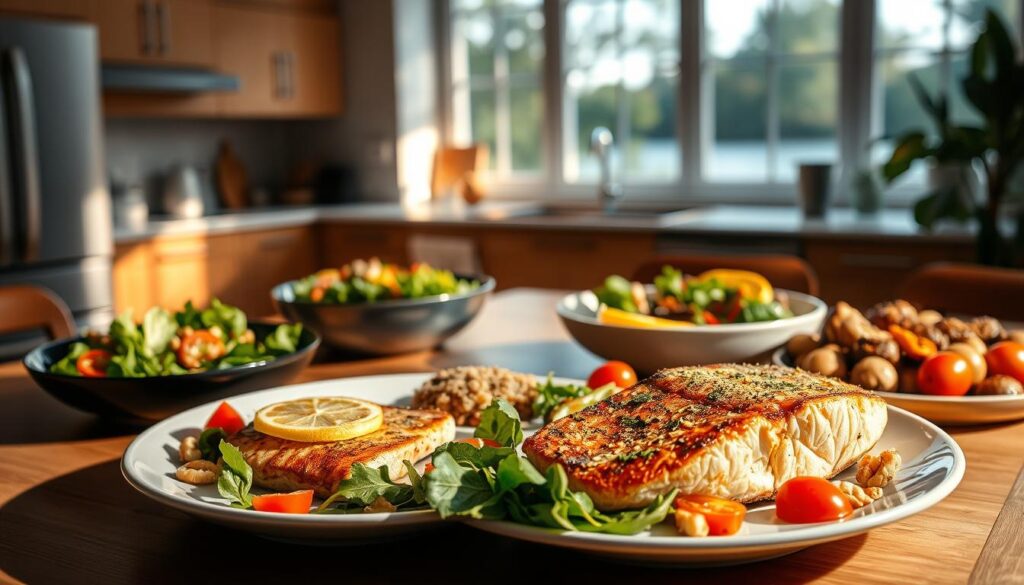This post contains affiliate links. As an Amazon Associate I earn from qualifying purchases
Embarking on a journey to a healthier lifestyle begins with the food we eat. Heart-healthy recipes are not just about cutting down on fats; they’re about embracing a balanced diet that nourishes our body and soul.
In this section, we’ll introduce you to the world of healthy eating ideas where flavor meets nutrition. Our goal is to empower you with the knowledge to make informed choices that benefit your heart health.
Key Takeaways
- Understanding the basics of a heart-healthy diet
- Exploring new ingredients for healthier meals
- Simple tips for incorporating heart-healthy recipes into your daily routine
- The importance of balanced nutrition for overall well-being
- Starting your journey to a healthier lifestyle with informed food choices
Understanding Heart Health and Nutrition
Embracing a heart-healthy lifestyle starts with understanding the nutritional foundations that support cardiovascular well-being. A well-balanced diet is crucial for maintaining a healthy heart, and it’s more than just reducing cholesterol levels; it’s about adopting a comprehensive nutritional approach.
What Is a Heart-Healthy Diet?
A heart-healthy diet is rich in whole foods, healthy fats, and essential nutrients. It focuses on consuming a variety of foods that are known to support heart health, such as fruits, vegetables, whole grains, lean proteins, and healthy fats. This dietary approach helps in maintaining healthy cholesterol levels and supports overall cardiovascular health.
Importance of Whole Foods
Whole foods are the cornerstone of a nutritious diet plan. They are rich in vitamins, minerals, and antioxidants that help protect against heart disease. Incorporating a variety of whole foods into your diet can help lower the risk of heart disease and support overall health. Examples include leafy greens, berries, whole grains, and lean meats.
The Role of Healthy Fats
Healthy fats play a critical role in a heart-healthy diet. They help lower bad cholesterol levels and are a rich source of energy. Foods high in healthy fats include avocados, nuts, seeds, and olive oil. Incorporating these foods into your low-cholesterol meals can enhance the nutritional value and support heart health.
By understanding and implementing these dietary principles, individuals can take a significant step towards achieving a healthier heart and overall well-being.
Benefits of Cooking at Home
Cooking at home is a simple yet effective way to take control of your diet and improve heart health. By preparing meals in the comfort of your own kitchen, you can make informed decisions about the ingredients and cooking methods used, ultimately leading to a healthier you.
Control Over Ingredients
One of the most significant advantages of cooking at home is having complete control over the ingredients that go into your meals. This means you can avoid processed foods, excessive salt, and added sugars, opting instead for fresh, whole ingredients that nourish your body.
As Julia Child once said, “The only time to eat diet food is while you’re waiting for the steak to cook.” This quote highlights the joy of cooking and the freedom to choose ingredients that make meals not only healthy but also enjoyable.
Healthier Cooking Methods
Cooking at home allows you to adopt healthier cooking methods such as baking, grilling, or steaming, rather than relying on fried foods. These methods help retain the nutritional value of your ingredients, ensuring your meals are both delicious and heart-healthy.
Family Bonding Through Meals
Cooking and sharing meals with family and friends can foster a sense of community and strengthen bonds. It’s an opportunity to create lasting memories and instill healthy eating habits in children, setting them up for a lifetime of wellness.
“The discovery of a new dish does more for human happiness than the discovery of a new star.” – Jean Anthelme Brillat-Savarin
Cost-Effective Choices
Preparing meals at home can also be cost-effective, as buying ingredients in bulk and planning meals around seasonal produce can help reduce grocery bills. This approach to cooking not only benefits your health but also your wallet.
By embracing home cooking, you can take a proactive approach to heart health, enjoying the many benefits that come with preparing wholesome, delicious meals in the comfort of your own home.
Essential Ingredients for Heart Health
The foundation of a heart-healthy meal lies in its ingredients, which include a variety of whole foods and nutrient-rich options. Incorporating the right foods into your diet can significantly impact your heart health.

Whole Grains You Should Try
Whole grains are a crucial component of a heart-healthy diet. They are rich in fiber, vitamins, and minerals that help lower cholesterol and improve overall heart health. Some excellent options include:
- Oats: High in soluble fiber, which can help reduce cholesterol levels.
- Quinoa: A complete protein that’s rich in fiber and minerals.
- Brown Rice: Rich in fiber and manganese, a mineral that helps protect against heart disease.
Heart-Healthy Proteins
Protein is essential for heart health, and choosing the right sources can make a significant difference. Opt for:
- Fatty Fish: Such as salmon and sardines, which are rich in omega-3 fatty acids.
- Legumes: Beans, lentils, and peas are high in protein, fiber, and various nutrients.
- Nuts and Seeds: Almonds, walnuts, and chia seeds are rich in healthy fats and antioxidants.
Fruits and Vegetables to Focus On
Fruits and vegetables are packed with vitamins, minerals, and antioxidants that support heart health. Aim to include a variety of colors on your plate:
- Leafy Greens: Spinach and kale are rich in vitamins and minerals.
- Berries: Blueberries, strawberries, and raspberries are high in antioxidants.
- Cruciferous Vegetables: Broccoli, cauliflower, and Brussels sprouts contain compounds that support heart health.
By incorporating these heart-friendly ingredients into your meals, you can take a significant step towards a healthier heart.
Breakfast Ideas to Start Your Day Right
Kick-start your morning with a delicious and healthy breakfast to boost your energy and support your heart health. Breakfast is an essential meal that helps jumpstart your metabolism and provides the necessary fuel for the day ahead.
Here are some tasty and nutritious breakfast ideas that fit into a heart-healthy diet:
Overnight Oats with Berries
Overnight oats are a simple and delicious breakfast option. Mix rolled oats with low-fat milk, and top with fresh or frozen berries. This dish is rich in fiber and antioxidants, making it a perfect start to your day.
Nutritional Benefits: High in fiber, antioxidants, and low in fat.
Spinach and Feta Egg Muffins
These egg muffins are a great make-ahead breakfast. Whisk eggs with salt and pepper, add diced spinach and crumbled feta cheese, pour into muffin tins, and bake until set. They’re a great source of protein and calcium.
Tip: Prepare a batch on Sunday evening and enjoy throughout the week.
Avocado Toast Variations
Avocado toast is a trendy and healthy breakfast choice. Toast whole-grain bread, mash an avocado, and spread on top. Add a sliced egg, salt, and pepper for extra protein. This meal is rich in healthy fats and fiber.
Here’s a comparison of the nutritional value of these breakfast ideas:
| Breakfast Idea | Calories | Fat (g) | Protein (g) |
|---|---|---|---|
| Overnight Oats with Berries | 250 | 4 | 5 |
| Spinach and Feta Egg Muffins | 180 | 10 | 12 |
| Avocado Toast | 320 | 22 | 6 |
Incorporating these delicious low-fat recipes into your breakfast routine can help you start your day on a healthy note. Experiment with different ingredients and flavors to keep your breakfasts exciting and nutritious.
Lunch Recipes for a Nourishing Midday Meal
When it comes to lunch, choosing heart-healthy options is easier than you think with these simple and tasty recipes. A nourishing midday meal can help you recharge and maintain your energy levels throughout the day. Incorporating heart-healthy menu options into your daily routine can significantly impact your overall well-being.
Quinoa Salad with Chickpeas and Veggies
This salad is a powerhouse of nutrition, combining the protein-rich benefits of chickpeas with the fiber-rich goodness of quinoa and a variety of colorful vegetables. To make it, you’ll need:
- 1 cup quinoa, rinsed and drained
- 2 cups water or vegetable broth
- 1 can chickpeas, drained and rinsed
- 1 cup mixed vegetables (such as bell peppers, carrots, and broccoli)
- 2 tablespoons olive oil
- 1 tablespoon lemon juice
- Salt and pepper to taste
Cook the quinoa according to package instructions. Mix with chickpeas, vegetables, olive oil, and lemon juice. Season with salt and pepper to taste.
Grilled Chicken Wrap with Spinach
A grilled chicken wrap is a satisfying and healthy option for lunch. To make it heart-healthy, use a whole-grain wrap and load it with spinach and other vegetables.
| Ingredient | Quantity |
|---|---|
| Grilled chicken breast | 4 oz |
| Whole-grain wrap | 1 |
| Fresh spinach leaves | 1 cup |
| Sliced cucumber and tomato | 1/2 cup |
Grill the chicken breast and slice it. Wrap it in a whole-grain wrap with spinach, cucumber, and tomato. Add your favorite sauce or seasoning.
Lentil Soup Packed with Flavor
Lentil soup is a comforting and nutritious option for lunch, rich in fiber and protein. To make it even more flavorful, add a variety of spices and herbs.
Benefits of Lentil Soup:
- High in fiber and protein
- Rich in vitamins and minerals
- Can help lower cholesterol levels
To make lentil soup, sauté onions, carrots, and celery in olive oil, then add lentils, broth, and your choice of spices. Simmer until the lentils are tender.
These lunch recipes are not only delicious but also packed with nutrients, making them perfect for a heart-healthy diet. By incorporating these heart-healthy menu options into your meal routine, you’re taking a significant step towards a healthier you.
Delicious Dinner Options for Your Evening
As the day comes to a close, dinner becomes an opportunity to savor a meal that’s both nourishing and delicious. Preparing heart-healthy recipes for dinner can be a great way to support your overall well-being. In this section, we’ll explore some tasty and nutritious dinner ideas that are perfect for the evening.

Baked Salmon with Asparagus
Baked salmon is a fantastic source of omega-3 fatty acids, which are known to support heart health. Pair it with asparagus, a vegetable rich in vitamins and antioxidants, and you have a meal that’s both flavorful and nutritious. To make this dish, simply season the salmon with lemon juice and herbs, and bake it in the oven with spears of asparagus until tender.
Chicken Stir-Fry with Broccoli
A chicken stir-fry with broccoli is a quick and easy dinner option that’s packed with protein and fiber. Using heart-healthy cooking methods like stir-frying with a small amount of olive oil, you can create a meal that’s not only delicious but also good for your heart. Add some garlic and ginger for extra flavor, and serve over brown rice or quinoa for a filling meal.
Vegetable Curry with Brown Rice
For a vegetarian dinner option, consider a vegetable curry made with a variety of colorful vegetables and served over brown rice. This dish is not only rich in fiber and vitamins but also in flavor, thanks to the use of aromatic spices. By choosing heart-healthy ingredients and cooking methods, you can enjoy a curry that’s both nourishing and satisfying.
These dinner recipes are just a few examples of how you can enjoy heart-healthy meals in the evening. By incorporating a variety of whole foods and nutritious ingredients, you can create meals that are both delicious and beneficial for your heart health.
Snack Ideas That Won’t Derail Your Diet
Healthy snacking is about more than just grabbing something quick; it’s about nourishing your body with the right foods. Snacking can be a great way to keep your energy levels stable and support your overall health.
Raw Nuts and Seeds Mix
A mix of raw nuts and seeds is a perfect snack that’s rich in healthy fats and protein. Almonds, walnuts, pumpkin seeds, and chia seeds are all great options.
These snacks are not only delicious but also packed with nutrients. You can customize your mix by choosing your favorite nuts and seeds.
Hummus with Fresh Veggies
Hummus made from chickpeas is a great source of protein and fiber. Pair it with fresh veggies like carrots, cucumbers, and bell peppers for a satisfying snack.
This combination is not only healthy but also very filling, making it perfect for curbing hunger between meals.
Greek Yogurt with Honey
Greek yogurt is rich in protein, and when paired with a drizzle of honey, it makes for a sweet and satisfying snack. This combo is a great way to get your daily dose of protein.
It’s also a versatile snack that can be enjoyed at any time of the day, whether you’re looking for a quick breakfast or a post-workout snack.
By incorporating these snack ideas into your daily routine, you can maintain a healthy diet without feeling deprived. These snacks are not only nutritious but also delicious and easy to prepare.
Tips for Preparing Heart-Healthy Meals
Heart-healthy cooking is not just about following recipes; it’s about adopting a lifestyle that prioritizes your well-being. By focusing on nutritious ingredients and cooking methods, you can create meals that are both delicious and beneficial for your heart.
Meal Prep and Planning
Effective meal preparation starts with planning. By dedicating a few hours each week to planning and prepping your meals, you can ensure you’re on track with your nutritious diet plans. This involves creating a shopping list, cooking in bulk, and storing meals in appropriate containers.
- Plan your meals around seasonal produce to ensure freshness and variety.
- Cook in bulk to save time during the week.
- Use containers that are safe for refrigeration and reheating.
Balancing Flavors and Textures
A heart-healthy meal doesn’t have to be bland. Balancing flavors and textures can elevate your dishes, making them more enjoyable. This can be achieved by incorporating a variety of ingredients, such as herbs, spices, lean proteins, and a range of colorful vegetables.
- Experiment with different herbs and spices to add flavor without salt.
- Incorporate a variety of textures, such as crunchy vegetables and tender proteins.
- Use citrus or vinegar to add a burst of flavor.
Incorporating Herbs and Spices
Herbs and spices are not only flavor enhancers but also have health benefits. They can add depth to your meals without adding extra salt or sugar. Some beneficial herbs and spices for heart health include turmeric, ginger, and basil.
By incorporating these tips into your cooking routine, you can create heart-healthy meals that are both nutritious and delicious, supporting your overall well-being and nutritious diet plans.
Real-Life Success Stories
Embracing a heart-healthy lifestyle can be a transformative journey, and hearing from individuals who have successfully made the change can be a powerful motivator. By incorporating low-cholesterol meals and easy heart-healthy dishes into daily life, many have experienced significant improvements in their overall well-being.
Success Stories from Healthy Eaters
Individuals who have adopted heart-healthy eating habits often report feeling more energetic and confident in their food choices. By focusing on whole foods and healthy fats, they are able to create delicious and nutritious meals that support their heart health.
Transforming Meal Plans
Transformational meal plans that emphasize whole grains, lean proteins, and a variety of fruits and vegetables can be a game-changer for those looking to adopt a heart-healthy lifestyle. These meal plans provide a clear roadmap for making sustainable changes that promote overall health.
Community Support for Heart Health
Having access to community resources and support can make a significant difference in maintaining a heart-healthy lifestyle. By connecting with others who share similar goals and challenges, individuals can stay motivated and inspired to continue making healthy choices.
FAQ
What are some easy ways to start incorporating heart-healthy recipes into my diet?
How can I make sure I’m getting the right balance of nutrients in my heart-healthy meals?
Are there any specific ingredients I should avoid when cooking heart-healthy meals?
Can you suggest some delicious and healthy snack options that are heart-friendly?
How can I make heart-healthy cooking more enjoyable and engaging for my family?
What are some tips for meal prep and planning heart-healthy meals in advance?
How can I stay motivated to continue cooking heart-healthy meals?
This post contains affiliate links. As an Amazon Associate I earn from qualifying purchases



